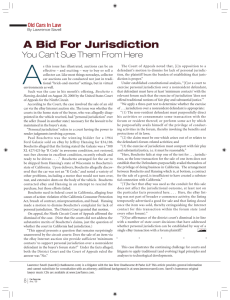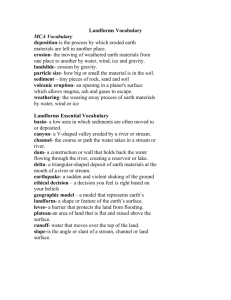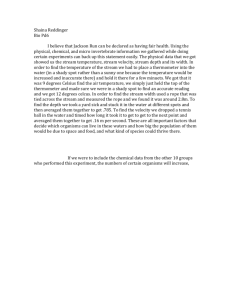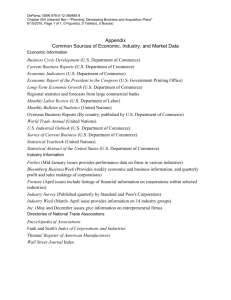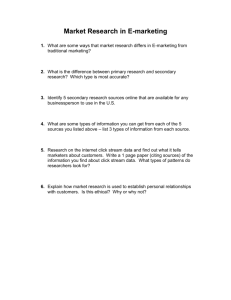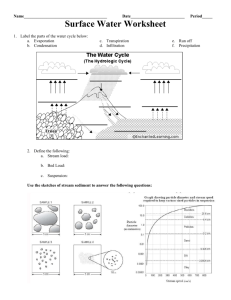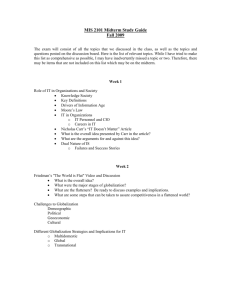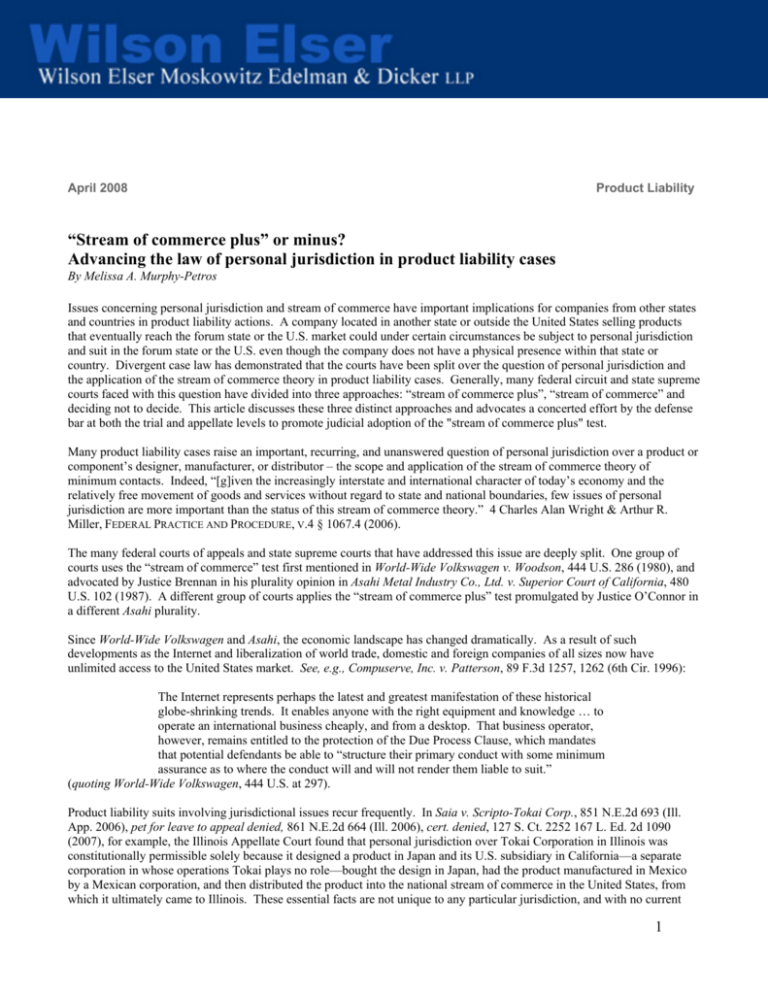
April 2008
Product Liability
“Stream of commerce plus” or minus?
Advancing the law of personal jurisdiction in product liability cases
By Melissa A. Murphy-Petros
Issues concerning personal jurisdiction and stream of commerce have important implications for companies from other states
and countries in product liability actions. A company located in another state or outside the United States selling products
that eventually reach the forum state or the U.S. market could under certain circumstances be subject to personal jurisdiction
and suit in the forum state or the U.S. even though the company does not have a physical presence within that state or
country. Divergent case law has demonstrated that the courts have been split over the question of personal jurisdiction and
the application of the stream of commerce theory in product liability cases. Generally, many federal circuit and state supreme
courts faced with this question have divided into three approaches: “stream of commerce plus”, “stream of commerce” and
deciding not to decide. This article discusses these three distinct approaches and advocates a concerted effort by the defense
bar at both the trial and appellate levels to promote judicial adoption of the "stream of commerce plus" test.
Many product liability cases raise an important, recurring, and unanswered question of personal jurisdiction over a product or
component’s designer, manufacturer, or distributor – the scope and application of the stream of commerce theory of
minimum contacts. Indeed, “[g]iven the increasingly interstate and international character of today’s economy and the
relatively free movement of goods and services without regard to state and national boundaries, few issues of personal
jurisdiction are more important than the status of this stream of commerce theory.” 4 Charles Alan Wright & Arthur R.
Miller, FEDERAL PRACTICE AND PROCEDURE, V.4 § 1067.4 (2006).
The many federal courts of appeals and state supreme courts that have addressed this issue are deeply split. One group of
courts uses the “stream of commerce” test first mentioned in World-Wide Volkswagen v. Woodson, 444 U.S. 286 (1980), and
advocated by Justice Brennan in his plurality opinion in Asahi Metal Industry Co., Ltd. v. Superior Court of California, 480
U.S. 102 (1987). A different group of courts applies the “stream of commerce plus” test promulgated by Justice O’Connor in
a different Asahi plurality.
Since World-Wide Volkswagen and Asahi, the economic landscape has changed dramatically. As a result of such
developments as the Internet and liberalization of world trade, domestic and foreign companies of all sizes now have
unlimited access to the United States market. See, e.g., Compuserve, Inc. v. Patterson, 89 F.3d 1257, 1262 (6th Cir. 1996):
The Internet represents perhaps the latest and greatest manifestation of these historical
globe-shrinking trends. It enables anyone with the right equipment and knowledge … to
operate an international business cheaply, and from a desktop. That business operator,
however, remains entitled to the protection of the Due Process Clause, which mandates
that potential defendants be able to “structure their primary conduct with some minimum
assurance as to where the conduct will and will not render them liable to suit.”
(quoting World-Wide Volkswagen, 444 U.S. at 297).
Product liability suits involving jurisdictional issues recur frequently. In Saia v. Scripto-Tokai Corp., 851 N.E.2d 693 (Ill.
App. 2006), pet for leave to appeal denied, 861 N.E.2d 664 (Ill. 2006), cert. denied, 127 S. Ct. 2252 167 L. Ed. 2d 1090
(2007), for example, the Illinois Appellate Court found that personal jurisdiction over Tokai Corporation in Illinois was
constitutionally permissible solely because it designed a product in Japan and its U.S. subsidiary in California—a separate
corporation in whose operations Tokai plays no role—bought the design in Japan, had the product manufactured in Mexico
by a Mexican corporation, and then distributed the product into the national stream of commerce in the United States, from
which it ultimately came to Illinois. These essential facts are not unique to any particular jurisdiction, and with no current
1
1953807.1
national uniform interpretation and application of the stream of commerce theory, some federal and state courts would
decline personal jurisdiction based on them; others would not. Cf. Savage v. Scripto-Tokai Corp., 147 F. Supp. 2d 86 (D.
Conn. 2001) (discussed infra and declining jurisdiction over Tokai in Connecticut on identical facts as those at issue in Saia).
Because there is no uniform national interpretation of the stream of commerce theory of minimum contacts in product
liability actions, any person or business involved in the design, manufacture, or distribution of a product for nationwide sale
is faced with uncertainty regarding an essential business concern—whether they may be hauled into court in every
jurisdiction where the product with which they were involved is sold, regardless of whether they intended its sale there.
Savage, 147 F. Supp. 2d at 93 (“[I]f the Court were to accept plaintiff’s explanation for why jurisdiction lies in Connecticut,
jurisdiction would of necessity lie in every state in the nation.”). This uncertainty has created an environment in which “little
predictability remains for potential plaintiffs and defendants in the present world economy.” Kopke v. A. Hartrodt S.R.L.,
629 N.W.2d 662, 685 (Wis. 2001), cert. denied, 534 U.S. 1079 (2002) (Crooks, J., dissenting).
Until the Supreme Court decides to resolve it, this uncertainty and its resultant implications must always be borne in mind by
product litigators as they frame their arguments seeking dismissal or venue changes on jurisdictional grounds. A concerted
effort by in-house counsel and the trial bar to promote judicial adoption of the “stream of commerce plus” test will lay the
groundwork for appellate advocates to continue their efforts to advance this critical area of the law in a direction beneficial to
the defense.
The Federal Circuits and the State Supreme Courts Are Deeply Split in Their Application of the Stream of Commerce
Theory
Which Stream to Follow?
The Supreme Court first considered the stream of commerce theory of minimum contacts in product liability actions in
World-Wide Volkswagen, 444 U.S. 286 (1980). In World-Wide Volkswagen, the question presented was whether an
Oklahoma court could exercise personal jurisdiction over an automobile retailer and wholesaler—both New York
corporations—in a product liability action. Id. at 288–89. The defendants’ only contact with Oklahoma was through the sale
of a car to a non-resident consumer in New York, who then drove the car to Oklahoma where the subject accident occurred.
Id. The Court found no “efforts [by defendants] to serve, directly or indirectly, the market for its products in [Oklahoma],”
id. at 297, and held that the defendants could not be subjected to personal jurisdiction where their alleged contacts with the
forum state were based on the unilateral act of the consumer and not on any act of their own. Id. at 298.
The plaintiffs in World-Wide Volkswagen argued that “because an automobile is mobile by its very design and purposes it
was ‘foreseeable’ that the [subject automobile] would cause injury in Oklahoma.” Id. at 295. The Court responded that
“‘foreseeability’ alone has never been a sufficient benchmark for personal jurisdiction under the Due Process Clause.” Id. at
295. The Court then noted, however, that foreseeability is not “wholly irrelevant:”
[T]he foreseeability that is critical to due process analysis is not the mere likelihood that a
product will find its way into the forum State. Rather, it is that the defendant’s conduct
and connection with the forum State are such that he should reasonably anticipate being
haled into court there.
Id. at 297.
Although the World-Wide Volkswagen Court held that “the mere likelihood that the product will find its way into the forum
State” is not “critical to due process analysis,” it also held that “the forum State does not exceed its powers under the Due
Process Clause if it asserts personal jurisdiction over a corporation that delivers its products into the stream of commerce
with the expectation they will be purchased by consumers in the forum State.” Id. at 298. These arguably conflicting
holdings left open the question of precisely what quality and quantity of contacts between a product’s non-resident
manufacturer-distributor-designer and the forum state would demonstrate an “expectation that [its products] will be
purchased by consumers in the forum State.” Id. at 298. While the Court clearly held that jurisdiction could not be based
upon the foreseeable unilateral actions of a consumer, it was not clear on when a defendant’s act of participating in the
2
1953807.1
placement of a product in the stream of commerce that foreseeably could end up in the forum state would satisfy the
minimum contacts requirement of the Due Process Clause.
Lower courts differed in their interpretation of World-Wide Volkswagen, as Justice O’Connor noted when the Court next
addressed the question in Asahi Metal Industry Co., Ltd. v. Superior Court of California, 480 U.S. 102 (1987):
Since World-Wide Volkswagen, lower courts have been confronted with cases in which
the defendant acted by placing a product in the stream of commerce, and the stream
eventually swept defendant’s product into the forum State, but the defendant did nothing
else to purposefully avail itself of the market in the forum State. Some courts have
understood the Due Process Clause, as interpreted in World-Wide Volkswagen, to allow
an exercise of personal jurisdiction to be based on no more than the defendant’s act of
placing the product in the stream of commerce. Other courts have understood … WorldWide Volkswagen to require the action of the defendant to be more purposefully directed
at the forum State than the mere act of placing a product in the stream of commerce.
Id. at 110 (O’Connor, J., plurality opinion).
Asahi presented the Court with the opportunity to clarify the stream of commerce issue, but it was unable to reach a majority
conclusion. In one plurality opinion, Justice O’Connor – joined by Chief Justice Rehnquist and Justices Powell and Scalia –
set out the “stream of commerce plus” theory of minimum contacts. Under the “stream of commerce plus” theory, a
defendant who places its product into the stream of commerce has minimum contacts with the forum state sufficient to
subject it to jurisdiction only where it has also done something purposefully directed toward the forum state:
The “substantial connection,” Burger King, 471 U.S. at 475, 105 S. Ct. at 2184; McGee,
355.U.S. at 223, 78 S. Ct. at 201, between the defendant and the forum state necessary for
a finding of minimum contacts must come about by an action of the defendant
purposefully directed toward the forum state. Burger King, supra, 471 U.S. at 476, 105
S. Ct. at 2184; Keeton v. Hustler Magazine, Inc., 465 U.S. 770, 774, 104 S. Ct. 1473,
1478, 79 L.Ed.2d 790 (1984). The placement of a product into the stream of commerce,
without more, is not an act of the defendant purposefully directed toward the forum State.
Additional conduct of the defendant may indicate an intent or purpose to serve the market
in the forum State, for example, designing the product for the market in the forum State,
advertising in the forum State, establishing channels for providing regular advice to
customers in the forum State, or marketing the product through a distributor who has
agreed to serve as the sales agent in the forum State. But a defendant’s awareness that
the stream of commerce may or will sweep the product into the forum State does not
convert the mere act of placing the product into the stream an act purposefully directed
toward the forum State.
Id. at 112 (emphasis in original) (O’Connor, J., plurality opinion).
Justice Brennan—joined by Justices White, Marshall, and Blackmun—disagreed. Id. at 116-122 (Brennan, J., plurality
opinion). He reasoned instead that minimum contacts exist whenever the defendant is “aware” that the “final product is
being marketed in the forum state”:
Under [Justice O’Connor’s] view, a plaintiff would be required to show “[a]dditional
conduct” directed toward the forum before finding the exercise of jurisdiction over the
defendant to be consistent with the Due Process Clause. Ibid. I see no need for such a
showing, however. The stream of commerce refers not to unpredictable currents or
eddies, but to the regular and anticipated flow of products from manufacture to
distribution to retail sale. As long as a participant in the process is aware that the final
product is being marketed in the forum State, the possibility of a lawsuit there cannot
3
1953807.1
come as a surprise. Nor will the litigation present a burden for which there is no
corresponding benefit. A defendant who has placed goods in the stream of commerce
benefits economically from the retail sale of the final product in the forum State, and
indirectly benefits from the State’s laws that regulate and facilitate commercial activity.
These benefits accrue regardless of whether that participant directly conducts business in
the forum State, or engages in additional conduct directed toward that State.
Id. at 117 (Brennan, J., plurality opinion).
The Supreme Court has not addressed the stream of commerce theory in the nearly 21 years since Asahi, and its failure in
Asahi to reach a majority on the issue has left unsettled the law of personal jurisdiction in product liability suits in both
federal and state courts across the country. See, e.g., Ruston Gas Turbines, Inc. v. Donaldson Co., Inc., 9 F.3d 415, 420 (5th
Cir. 1993) (“Asahi does not provide clear guidance on the ‘minimum contacts’ prong.”); Vermuelen v. Renault, U.S.A. Inc.,
965 F.2d 1014, 1024-1025 (11th Cir. 1992), cert. denied, 508 U.S. 907 (1993) (“[T]he current state of the law regarding
personal jurisdiction is unsettled.”); Ruckstuhl v. Owens Corning Fiberglas Corp., 731 So.2d 881, 889 (La. 1999), cert.
denied, 528 U.S. 1019 (1999) (“[W]e have no Supreme Court precedent that guides us as to which theory, if either, represents
the law.”). Indeed, commentators now refer to personal jurisdiction in product liability suits as a “quagmire” in which
“confusion and disagreement are the order of the day.” Andrew Kurvers Spalding, Note: In the Stream of Commerce Clause:
Revisiting Asahi in the Wake of Lopez and Morrison, 4 NEV. L. J. 141, 155 (2003) (“quagmire”); Robert J. Condlin,
“Defendant Veto” or “Totality of the Circumstances?” It’s Time for the Supreme Court to Straighten Out the Personal
Jurisdiction Standard Once Again, 54 CATH. U. L. REV. 53, 147 (2004) (“confusion and disagreement are the order of the
day”).
Three Distinct Approaches
With no majority in Asahi, the many federal circuit and state supreme courts that have been faced with a stream of commerce
question in a product liability action have divided into three dichotomous approaches.
“Stream of Commerce Plus”
The first group of courts has adopted Justice O’Connor’s “stream of commerce plus” theory. This group holds that personal
jurisdiction over a product’s manufacturer-designer-distributor is permissible where the product is placed in the stream of
commerce and where the defendant has undertaken additional conduct specifically directed toward the forum state, such as
advertising there or designing the product specifically for its market. This group includes the First and Sixth Circuits, as well
as the states of Michigan, Mississippi, Missouri, Montana, Nebraska, New Hampshire, Pennsylvania, Rhode Island, South
Dakota, and the District of Columbia. See, e.g., Rodriguez v. Fullerton Tires Corp., 115 F.3d 81, 85 (1st Cir. 1997); Boit v.
Gar-Tec Products, Inc., 967 F.2d 671, 682–83 (1st Cir. 1992); Fortis Corporate Ins. v. Viken Ship Management, 450 F.3d
214, 218–21 (6th Cir. 2006); Bridgeport Music, Inc. v. Still N The Water Publishing, 327 F.3d 472, 479–80 (6th Cir. 2003),
cert. denied, 540 U.S. 948 (2003); Hapner v. Solis Apparatus v. Manufactories, Ltd., 411 N.W.2d 439, 447–50 (Mich. 1987);
Sorrells v. R 7 R Custom Coach Works, Inc., 636 So.2d 668, 669, 674–75 (Miss. 1994); Conway v. Royalite Plastics, Ltd., 12
S.W.3d 314, 318–19 (Mo. 2000); Bedrejo v. Triple E Canada, Ltd., 984 P.2d 739, 742 (Mont. 1999); Wagner v. Unicord
Corp., 526 N.W.2d 74, 78–80 (Neb. 1995); Vermont Wholesale Building Products, Inc. v. J.W. Jones Lumber Co., Inc., 914
A.2d 818, 822–28 (N.H. 2006); Kachur v. Yugo Motor Corp., 632 A.2d 1297, 1300–01 (Pa. 1993); Anderson v. Metropolitan
Life Ins. Co., 694 A.2d 701, 703 (R.I. 1997); Frankenfeld v. Crompton Corp., 697 N.W.2d 378, 382-386 (S.D. 2005); Holder
v. Haarmann & Reimer Corp., 779 A.2d 264, 275 (D.C. 2001).
“Stream of Commerce”
A second group of courts has adopted Justice Brennan’s “stream of commerce” theory. This group holds that personal
jurisdiction over a product’s manufacturer-designer-distributor in the forum state is permissible where the product is placed
into the stream of commerce; no additional conduct of the defendant directed toward the forum state is required. It includes
those courts that have explicitly chosen to follow the “expectation-stream of commerce” sentence in World-Wide Volkswagen
(444 U.S. at 298) on the ground that World-Wide Volkswagen was the last Supreme Court case to yield a majority on the
amount of contact required to support personal jurisdiction under the stream of commerce theory. These courts rely upon
World-Wide Volkswagen for the proposition that a product liability defendant has minimum contacts with the forum state if it
4
1953807.1
could have foreseen or was aware that a finished product placed into the stream of commerce would make its way into the
forum state. Taken together, this group includes the Fifth, Seventh, and Eighth Circuits, along with the states of Alabama,
Arizona, North Dakota, Utah, Washington, West Virginia, and Wisconsin. See, e.g., Luv n’ Care, Ltd. v. Insta-Mix, Inc., 438
F.3d 465, 469–70 (5th Cir. 2006), cert. denied, ___ U.S. ___, 126 S.Ct. 2968 (2006); Ruston Gas Turbines, Inc. v. Donaldson
Co., Inc., 9 F.3d 415, 418–20 (5th Cir. 1993); Jennings v. AC Hydraulic A/S, 383 F.3d 546, 550–51 (7th Cir. 2004); Dehmlow
v. Austin Fireworks, 963 F.3d 941, 946–48 (7th Cir. 1992); Stanton v. St. Jude Medical, Inc., 340 F.3d 690, 693–94 (8th Cir.
2003); Clune v. Alimak AB, 233 F.3d 538, 542-545 (8th Cir. 2000), cert. denied, 533 U.S. 929 (2001); Vandelune v. 4B
Elevator Components Unlimited, 148 F.3d 943, 947–48 (8th Cir. 1998), cert. denied, 525 U.S. 1018 (1998); Barone v. Rich
Bros. Interstate Display Fireworks Co., 25 F.3d 610, 614–15 (8th Cir. 1994), cert. denied, 513 U.S. 948 (1994); Ex Parte
Lagrone, 830 So.2d 620, 627–28 (Ala. 2002); A. Uberti and C. v. Leonardo, 892 P.2d 1354, 1362–64 (Ariz. 1995), cert.
denied, 516 U.S. 906 (1995); Beaudoin v. South Texas Blood & Tissue Center, 699 N.W.2d 421, 426 (N.D. 2005); Arguello
v. Industrial Woodworking Machine Co., 838 P.2d 1120, 1124–25 (Utah 1992); Grange Ins. Association v. State, 757 P.2d
933, 938 (Wash. 1988), cert. denied, 490 U.S. 1004 (1989); Hill v. Showa Denko, K.K., 425 S.E.2d 609, 616 (W. Va. 1992),
cert. denied, 508 U.S. 908 (1993); Kopke v. A. Hartrodt S.R.I., 629 N.W.2d 662, 674 (Wis. 2001), cert. denied, 534 U.S.
1079 (2002).
Deciding Not to Decide
A final group of courts has expressly and explicitly decided not to decide the question of how to apply the stream of
commerce theory of personal jurisdiction in product liability suits given the “unfortunate ambiguity created by Asahi.”
Dehmlow, 963 F.2d at 949 (Ripple, J., concurring). These courts instead decide each case on its own facts, with the result
being “a crazy-quilt pattern of jurisdictional policies and standards that no longer resembles its historical antecedents or has
any unifying principle, consistency, or predictive capability.” Condlin, 54 CATH. U. L. REV. at 1147. As the Sixth Circuit
noted when it left this group in favor of joining the First Circuit and adopting the “stream of commerce plus” theory, the
courts who have not have decided to “undertak[e] the time-consuming task of analyzing the facts under all three [Asahi]
approaches, and then … select an approach based on the end result.” Bridgeport Music, 327 F.2d at 480. This group
includes the Second, Third, and Eleventh Circuits, and the states of Louisiana, Minnesota, New Jersey, and Texas. See, e.g.,
Kernan v. Kurz-Hastings, Inc., 175 F.3d 236, 243–44 (2d Cir. 1999); Pennzoil Products Co. v. Colelli & Associates, Inc., 149
F.3d 197, 203–05 (3d Cir. 1998); Vermeulen v. Renault, U.S.A., Inc., 985 F.2d 1534, 1548 (11th Cir. 1993), cert. denied, 508
U.S. 907 (1993); Ruckstuhl v. Owens Corning Fiberglas Corp., 731 So. 2d 881, 889–90 (La. 1999), cert. denied, 528 U.S.
1019 (1999); Juelich v. Yamazaki Mazak Optonics Corp., 682 N.W. 2d 565, 572 (Minn. 2004); Lebel v. Everglades Marina,
Inc., 558 A.2d 1252, 1253 (N.J. 1989); CMMC v. Salinas, 929 S.W.2d 435, 439–40 (Tex. 1996).
Saia (Illinois) v. Savage (Connecticut): A Real-Life Example of the Courts’ Conflict in Action
In Saia v. Scripto-Tokai, 851 N.E.2d 693 (Ill. App. 2006), cert. denied, ___ U.S. ___, 127 S. Ct. 2252 (2007), the Illinois
Appellate Court applied Justice Brennan’s “stream of commerce” test to find that personal jurisdiction over Tokai
Corporation was constitutionally permissible because—despite Tokai’s undisputed lack of minimum contacts with Illinois—a
product it designed in Japan was placed into the national stream of commerce by its U.S. subsidiary. By contrast, in Savage
v. Scripto-Tokai Corp., 147 F. Supp. 2d 86 (D. Conn. 2001), the court applied the “stream of commerce plus” test to identical
facts as those in Saia and found that Connecticut could not exercise jurisdiction over Tokai.
The plaintiffs in both Saia and Savage sued Tokai after a lighter it designed in Japan caused a house fire. Saia, 851 N.E.2d at
695; Savage, 147 F. Supp. 2d at 88. The plaintiffs in both cases asserted that personal jurisdiction over Tokai was
constitutionally permissible in Illinois and Connecticut, respectively, because Tokai sold the lighter design to Scripto, and
Scripto had the lighter manufactured in Mexico by a Mexican corporation and then distributed the lighter into the national
stream of commerce from which it ended up in both states. Saia, 851 N.E.2d at 695–96; Savage, 147 F. Supp. 2d at 89–90.
It was undisputed in both cases that Tokai had no minimum contacts with either Illinois or Connecticut. Saia, 851 N.E.2d at
695–96; Savage, 147 F. Supp. 2d at 88–89.
In Saia, the appellate court acknowledged that “in … this case, [Tokai] did not directly market its product in [Illinois], and
[plaintiff] failed to show the extent of [Tokai’s] indirect benefit from sales in Illinois.” Id., 851 N.E.2d at 698. However, the
appellate court nevertheless held that personal jurisdiction could be imposed upon Tokai because Scripto—its U.S.
5
1953807.1
subsidiary—placed the lighter into the national stream of commerce, through which the lighter ultimately ended up in
Illinois. Id. at 698-701. The appellate court found that “it is a reasonable inference” that Tokai “obtained considerable
indirect benefit from the profits [Scripto] earns from sales in Illinois of lighting rods [Tokai] designed,” (Id. at 700) because
Scripto “distributed the lighting rods to various [national] customers, including K mart, and some of those customers sold
[the] lighting rods in Illinois” (Id. at 699):
Since Tokai owns all the shares of the distributor, Scripto, and Scripto owns the
manufacturer, Tokai obtains all profits from the manufacture and sale in this state of the
product it designed. We find the record sufficient to support the conclusion that Tokai
obtained considerable indirect benefit from the profits its wholly owned subsidiary earns
from sales in Illinois of lighting rods Tokai designed.
Id. at 700.
By contrast, in Savage, the district court granted Tokai’s motion to dismiss for lack of personal jurisdiction applying the
“stream of commerce plus” test (147 F. Supp. 2d at 92) because, it reasoned, “the focus must remain on the defendant’s
contacts with the forum state” (147 F. Supp. 2d at 93):
It is undisputed that Tokai has no specific connections to the State of Connecticut, and
plaintiff conceded at oral argument that if the court were to accept plaintiff’s explanation
for why jurisdiction lies in Connecticut, jurisdiction would of necessity lie in every state
in the nation. Such “national contacts” or “aggregate contacts” have been recognized as a
basis for jurisdiction, when they have been recognized at all, only in federal question
cases involving statutes authorizing nationwide service of process. The Court agrees
with [Tokai] that in the absence of any congressional enactment providing for national
jurisdiction over foreign corporations for products liability purposes, the focus must
remain on [Tokai]’s contacts with the forum state.
147 F. Supp. 2d at 93 (citations omitted).
***
The Court concludes that this record does not constitute a prima facie showing of
jurisdiction over Tokai, because it does not allow the inference that Tokai injected the
Aim ‘n Flame lighter into the stream of commerce, or engaged in any of the additional
factors necessary under Justice O’Connor’s “stream of commerce plus” theory. Tokai
has not manufactured the product since 1991; in fact, it appears that the manufacturing
facilities in Mexico deal with Scripto, not the corporate parent, Tokai. The mere fact that
Tokai is the designer of the subject product is insufficient to create personal jurisdiction;
accepting such a theory would allow for the exercise of jurisdiction over every basement
inventor in the world, simply because a product he or she conceived was manufactured
and ended up in Connecticut.
147 F. Supp. 2d at 94 (citations omitted).
Of note, the Savage court, unlike the Saia court, specifically held that Tokai’s ownership of Scripto was an insufficient basis
for personal jurisdiction:
While plaintiffs purport not to rely on aggregate contacts as the source for jurisdiction
here, their theory—that establishing a national distribution system through a whollyowned subsidiary constitutes purposeful availment—is really just that. However, mere
ownership by a parent corporation present in the forum state generally will not subject the
parent to personal jurisdiction in that forum. This rule applies even when the separation
between parent and subsidiary is merely formal, as long as it is real.
147 F. Supp. 2d at 93 (citations omitted).
6
1953807.1
The Conflict Creates Significant Problems for All Parties to a Product Liability Action
Like all businesses, product designers, manufacturers, and distributors frequently structure their business operations to avoid
contact with certain states. They do this for a variety of reasons, including taxes; labor costs; right-to-work/union issues; the
state regulatory environment; quality of the labor force; and the state’s educational infrastructure. When a business entity
actively and affirmatively avoids contact with a particular state, it necessarily follows that the business does not have the
minimum contacts with that state necessary for that state to exercise jurisdiction over it consistent with the Due Process
Clause. World-Wide Volkswagen recognized this point:
The Due Process Clause, by “ensuring the orderly administration of the laws,”
International Shoe Co. v. Washington, 326 U.S. at 319, 66 S. Ct. at 159, gives a degree of
predictability to the legal system that allows potential defendants to structure their
primary conduct with some minimum assurance as to where that conduct will and will
not render them liable to suit.
World-Wide Volkswagen, 444 U.S. at 297.
The minimum contacts test applicable to defendants in a product liability suit should thus provide certainty to those involved
in the design, manufacture, or distribution of a product that is placed in the stream of commerce. Product designers,
manufacturers, and distributors should be able to plan for the potential of defending a suit in a particular state, or they should
be able to avoid contacts with a particular state. No one can plan appropriately if the applicable personal jurisdiction
standards differ across the country, as Luv n’ Care v. Insta-Mix, Inc., 438 F.3d 465 (5th Cir. 2006), cert. denied, ___ U.S.
___, 126 S. Ct. 2968 (2006), illustrates.
In Luv n’ Care, a Fifth Circuit majority applied the “stream of commerce” theory and found that jurisdiction over the
defendant bottle designer was permissible in Louisiana despite the fact that the defendant was a Colorado corporation with no
contacts to Louisiana. Id. at 470–71. The majority based its decision on the fact that the defendant sold approximately
82,000 of its bottles to Wal-Mart in Colorado, who eventually distributed them in Louisiana without the defendant’s
knowledge. Id. at 471–74. In reaching this conclusion, the majority rejected the defendant’s argument that it had “structured
its primary conduct to avoid jurisdiction by including in the vendor agreement a condition that transfers ownership from
[defendant] to Wal-Mart at the time that Wal-Mart receives its shipments in Colorado Springs” (Id. at 471):
We disagree with [defendant] that this conclusion means that it must choose between
doing business with Wal-Mart or being subject to suit in all fifty states. It is possible that
[defendant] will avoid suit in a jurisdiction that requires some additional act beyond
“mere foreseeability” for personal jurisdiction to attach. See, e.g., Boit v. Gar-Tec
Prods., Inc., 967 F.2d 671, 683 (1st Cir. 1992). … [Defendant] could also attach
conditions to its vendor agreement that forbid Wal-Mart from shipping to those states that
operate under a “mere foreseeability” regime, or to all distribution centers outside the
Great Plains, or to any forum in which mounting a defense would be inconvenient.
Id. at 472 n. 13.
The “Stream of Commerce Plus” Test Is the Most Consistent with Federalism and Due Process
At both the trial and appellate levels, in-house counsel and product litigators should advance the argument that all courts
should adopt Justice O’Connor’s “stream of commerce plus” test as the national uniform standard for determining personal
jurisdiction in product liability actions. For the reasons discussed throughout, the “stream of commerce plus” test is the test
that most closely comports with federalism and due process.
In World-Wide Volkswagen, the Court addressed the interplay between the concept of minimum contacts and the principles of
federalism:
The concept of minimum contacts … can be seen to perform two related, but
distinguishable, functions. It protects the defendant against the burdens of litigating in a
7
1953807.1
distant or inconvenient forum. And it acts to ensure that the States through their courts,
do not reach out beyond the limits imposed on them by their status as coequal sovereigns
in a federal system.
World-Wide Volkswagen, 444 U.S. at 291–92. The constitutional principles of federalism thus require that a defendant’s
minimum contacts with the forum state be established as a necessary prerequisite to jurisdiction:
[W]e have never accepted the proposition that state lines are irrelevant for jurisdictional
purposes, nor could we, and remain faithful to the principles of interstate federalism
embodied in the Constitution. The economic interdependence of the States was foreseen
and desired by the Framers. In the Commerce Clause, they provided that the nation was
to be a common market, a “free trade unit” in which the States are debarred from acting
as separable economic entities. H.P. Hood & Sons, Inc. v. Du Mond, 336 U.S. 525, 538,
69 S. Ct. 657, 665, 93 L. Ed. 865 (1949). But the Framers also intended that the States
retain many essential attributes of sovereignty, including, in particular, the sovereign
power to try causes in their own courts. The sovereignty of each State, in turn, implied a
limitation on the sovereignty of all of its sister States—a limitation express or implicit in
both the original scheme of the Constitution and the Fourteenth Amendment.
Id. at 293.
Justice O’Connor’s “stream of commerce plus” test protects state sovereignty by requiring a showing that the defendant
purposefully directed its actions toward the forum state in some way beyond the placement of a product into the stream of
commerce. Asahi, 480 U.S. at 112 (O’Connor, J., plurality opinion). By contrast, the “stream of commerce” test erases state
boundaries – under that test, “jurisdiction would of necessity lie in every state in the nation.” Savage, 147 F. Supp. 2d at 93.
See also Lessnick v. Hollingsworth & Vose Co., 35 F.3d 939, 945 (4th Cir. 1994), cert. denied, 513 U.S. 1151 (1995) (“To
permit a state to assert jurisdiction over any person in the country whose product is sold in the state simply because a person
must expect that to happen destroys the notion of individual sovereignties inherent in our system of federalism.”). By
requiring the defendant to take an action directed toward the forum state before jurisdiction can be found, the “stream of
commerce plus” test upholds the unique sovereignty of each state.
The “stream of commerce” plus test also best meets the requirements for due process, under which a “defendant’s contacts
with the forum State must be such that maintenance of the suit does not offend traditional notions of fair play and substantial
justice.” World-Wide Volkswagen, 444 U.S. at 292 (internal quotations omitted). It is inherently unfair—as the “stream of
commerce” test allows—to “subject defendants to judgment in locations based on the activity of third persons and not the
deliberate conduct of the defendant, making it impossible for defendants to plan and structure their business contacts and
risks.” Lessnick, 35 F.3d at 945. Indeed, the “stream of commerce” test in those jurisdictions where it is applied has created
the precise result that was rejected in World-Wide Volkswagen: that “[e]very seller of chattels would in effect appoint the
chattel his agent for service of process. His amenability to suit would travel with the chattel.” World-Wide Volkswagen, 444
U.S. at 295.
About the Author
Melissa A. Murphy-Petros, Of Counsel with Wilson Elser in Chicago, concentrates her practice in post-trial and appellate
litigation nationwide. She briefed and argued Saia v. Scripto-Tokai Corp., 851 N.E.2d 693 (Ill. App. 2006), cert. denied, ___
U.S. ___, 127 S. Ct. 2252 (2007), and was counsel of record before the Supreme Court. DRI supported Ms. Murphy-Petros’
petition for writ of certiorari in Saia with a motion for leave to file a brief as amicus curiae. Ms. Murphy-Petros is a member
of DRI’s Appellate Advocacy Committee and Amicus Subcommittee.
This article was originally published in DRI In-House Defense Quarterly, Spring 2008.
This article is for general guidance only and does not contain definitive legal advice.
Contact us at productliability@wilsonelser.com.
© 2008 Wilson Elser Moskowitz Edelman & Dicker LLP. All Rights Reserved.
8
1953807.1

